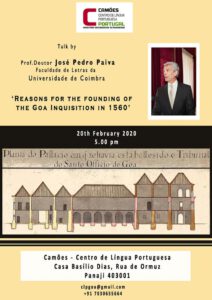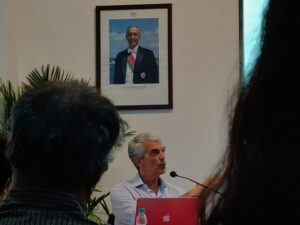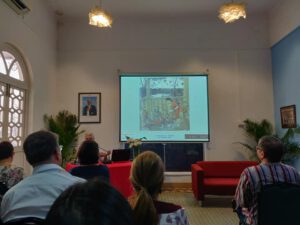
At Instituto Camões, Panjim, Professor José Pedro Paiva of the University of Coimbra provided a lucid rationale for the establishment of the Tribunal of the Inquisition in Goa (1560-1812). His talk was titled “Reasons for the Founding of the Goa Inquisition in 1560”. He stated, among other things, that even prior to the arrival of St Francis Xavier the Religious had endeavoured to establish the Tribunal in Goa.
For my part, convinced that no serious student of history should depend exclusively on Charles Gabriel Dellon’s much-quoted account titled Relation de l’Inquisition de Goa (1687) and Bombay-based A. K. Priolkar’s expedient interpretations of the Frenchman’s allegations, I asked the erudite Professor where one would find fresh archival sources to counter their claims. He pointed to the Portuguese and Brazilian archives.
Without a doubt, the Tribunal, like every human enterprise, had its shortcomings; but having said that, by no means do Dellon and Priolkar deserve a clean chit. While the testimony of the former, who was tried and incarcerated by the Tribunal, is largely suspect, the latter’s narrative fails to contextualize the institution, and his vitriolic language hardly behoves a researcher. It is curious to note that his work appeared in the year 1961, a watershed in the history of Goa and Portugal.

It is a pity that there has hardly been any comprehensive study of the Goa Inquisition, particularly in the English language. And alas, just as a big lie told frequently enough is finally believed, unsuspecting readers have found themselves trapped in a web of lies regarding the nature and purpose of the Inquisition. It is heartening that a younger crop of researchers has been shedding fresh light on the subject and overturning previous findings or misplaced conclusions.
Meanwhile, as the matter in question often boils down to the number of deaths at the stake, I was keen to know details of the same. The exact figure will never be known, since the relevant papers are unavailable, for reasons too complex to mention here. However, Professor Paiva authoritatively stated that, based on the lists of names available in Lisbon, the number of trials held in Goa, over a period of 250 years (1560-1812), are reckoned at 14,000 and the convictions at 800, the average thus being 3.2 deaths per annum.

Comparisons may be odious, but can we overlook the odious crime of human sacrifice perpetrated in Indian society outside the borders of Goa during that same historical period? Some of them had religious sanction, others were committed arbitrarily, but none gave any scope for self-defence or mercy. Similarly, who can deny that the number of convictions by criminal courts far exceeded the inquisition tribunal’s annual average of convictions?
Finally, those numbers pale by comparison to the political and other inquisitions at work in the twenty-first century, many of which – please note – do not have even the semblance of a tribunal or a fair trial. Hence, a sense of history and fair play are a must to understand the rationale behind the Inquisition tribunal set up in Goa way back in the sixteenth century.